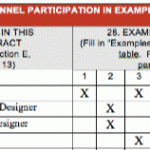
Lesson of the Day: Don’t Let Perfect be the Enemy of Good Enough!
This site has officially launched. The first lesson you can learn from this site is simple: Don’t let perfect be the enemy of good enough.
When we do something, we want to make sure we do it right. So often we put it aside until we can give it the time and energy that it deserves. And there it sits, the thing you would like to do. And maybe we are reminded of it now and again as we say, “I really should do that. But I want to do it right.”
It could be a conversation or a new initiative or something we have to review or a decision we have to make or something on our someday/maybe list. In our minds, it needs to be perfect. But here’s the thing, no it doesn’t. I’m going to let you in on a little marketing secret, there has never been a perfect proposal submitted, there has never been a perfect article published, and there has never been a perfect speech or sales pitch given.
Have there been crappy proposals submitted? Yes. Have any of them been submitted by me? Yes (I admit it). Have any of them won work. Yes. Have I been beaten by proposals that I would consider an embarrassment to our profession? Yes.
Should I be writing this on a word processor? Maybe, but my phone will do? Should I have spent more time making this website? Maybe, but I threw it together in a couple of hours. Should I be using spellcheck? I should use spellcheck, we’ll see.
There are far too many things to deal with, too many obligations to fill, and too many tasks to do today. And there will be more tomorrow. If you really want to do something and if you really should be doing it, just start doing it. The journey of a thousand miles begins with one step. Success is moving from failure to failure without losing enthusiasm. Plan to trip up. Shoot for not perfect. Because your 80% is most likely better than my 100%. And despite what you are taught, 80% of a great job is almost always better than not doing the thing you want to do, that thing you know you should do, at all.
Let’s not let perfect be the enemy of good enough. Let’s not spend any more time worrying “what if it’s not perfect?” It’s not going to be perfect. But it won’t be a true failure until you give up on it.
I saw Ford Harding, author of the book Rainmaker (which you can now pick up at your local Kinko’s), speak at SMPS DC the other day. He mentioned that our internal expectation of perfect often stops us from developing the business we could be. I agree with that. I’ve seen it. I’ve experienced it. Another thing that he said is that the technical staff is expected to be perfect in their technical work. Marketers have to show the technical staff that their business development efforts don’t have to be perfect. You don’t have to bring back business every time you meet with a potential new client. Just being at that meeting is a little success. And those little successes add up.
One way to do that might be to shake up a misconception. If you are signing and sealing technical drawings, they actually do not have to be perfect. Perfect is not the expectation of technical work. Perfect is not the “standard of care” an architect or an engineer is held to in a court of law. The “standard of care” is doing as good of a job as any other professional would have (I’m not a lawyer, so this is not legal advice). Every aspect of our life is graded on a curve. Its time that we walk into the classroom with that knowledge in mind.
How can you apply this to your life and career today? Submit a comment to this post. Submit your own post. It doesn’t have to be perfect. It just has to be honest and meet some very minimal guidelines. Give it your 80%. It may just be brilliant!





I wish I could shake this whole theory into the minds of my nit-picky, overly detail-oriented managers. Of course I strive for 100%, but that puts so much pressure on that I usually end up missing that 20% you speak of, in the form of mistakes and errors. Not big errors, like I missed a few resumes or a cover letter, but tiny ones like the font for one line on the SF330 was wrong on one form. Or my boxes on my org chart didn’t line up. It’s never endingly frustrating.